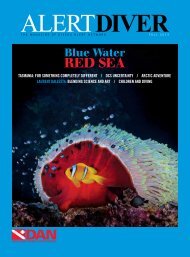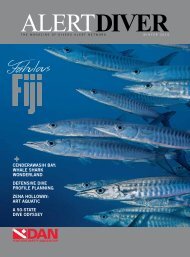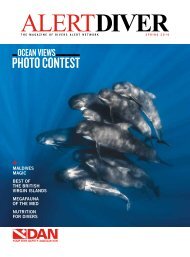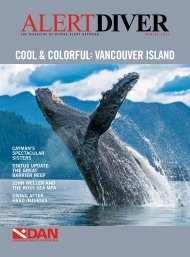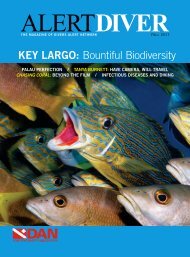AD 2018 Q1
Alert Diver is the dive industry’s leading publication. Featuring DAN’s core content of dive safety, research, education and medical information, each issue is a must-read reference, archived and shared by passionate scuba enthusiasts. In addition, Alert Diver showcases fascinating dive destinations and marine environmental topics through images from the world’s greatest underwater photographers and stories from the most experienced and eloquent dive journalists in the business.
Alert Diver is the dive industry’s leading publication. Featuring DAN’s core content of dive safety, research, education and medical information, each issue is a must-read reference, archived and shared by passionate scuba enthusiasts. In addition, Alert Diver showcases fascinating dive destinations and marine environmental topics through images from the world’s greatest underwater photographers and stories from the most experienced and eloquent dive journalists in the business.
You also want an ePaper? Increase the reach of your titles
YUMPU automatically turns print PDFs into web optimized ePapers that Google loves.
and posture, which indicate its<br />
general well-being and behavior.<br />
Mote scientists used these<br />
data to study how catch-andrelease<br />
activities affect sharks,<br />
identifying 19 specific measures<br />
to indicate survival and recovery.<br />
Accelerometers cost only about 15<br />
percent of what satellite tags cost<br />
and can be reused multiple times.<br />
“We hope that eventually we’ll<br />
be able to use accelerometers to<br />
determine things like when and<br />
where sharks feed and mate,”<br />
Hueter said. These additional<br />
details about where sharks go and<br />
when and what they do there will<br />
help improve management and<br />
conservation of these species. For<br />
example, tagging data can help<br />
scientists determine a species’<br />
home range as well as how much<br />
of that range falls within protected<br />
areas or overlaps with commercial<br />
fishing areas, Hammershlag<br />
said. That makes it possible to<br />
configure boundaries of both<br />
types of areas to make protections<br />
more effective.<br />
Why go to all this trouble to<br />
protect sharks? Aside from their<br />
allure for divers, these top-ofthe-food-chain<br />
predators play<br />
key roles in healthy oceans.<br />
“Eliminating sharks<br />
destabilizes the balance of the<br />
ecosystem,” Hueter said. “You<br />
can actually have collapse of the<br />
system and death of habitats.<br />
We have field studies that<br />
show that shark depletion from<br />
overfishing has resounding,<br />
profound effects on habitats<br />
such as coral reefs.”<br />
Sharks also have significant<br />
economic value. Scientists estimate<br />
that shark tourism generates<br />
more than $314 million annually<br />
worldwide, including some $124<br />
million in the Caribbean, $40<br />
million in Australia and New<br />
Zealand, $80 million in the<br />
Bahamas and $20 million in the<br />
ALERTDIVER.COM | 23



